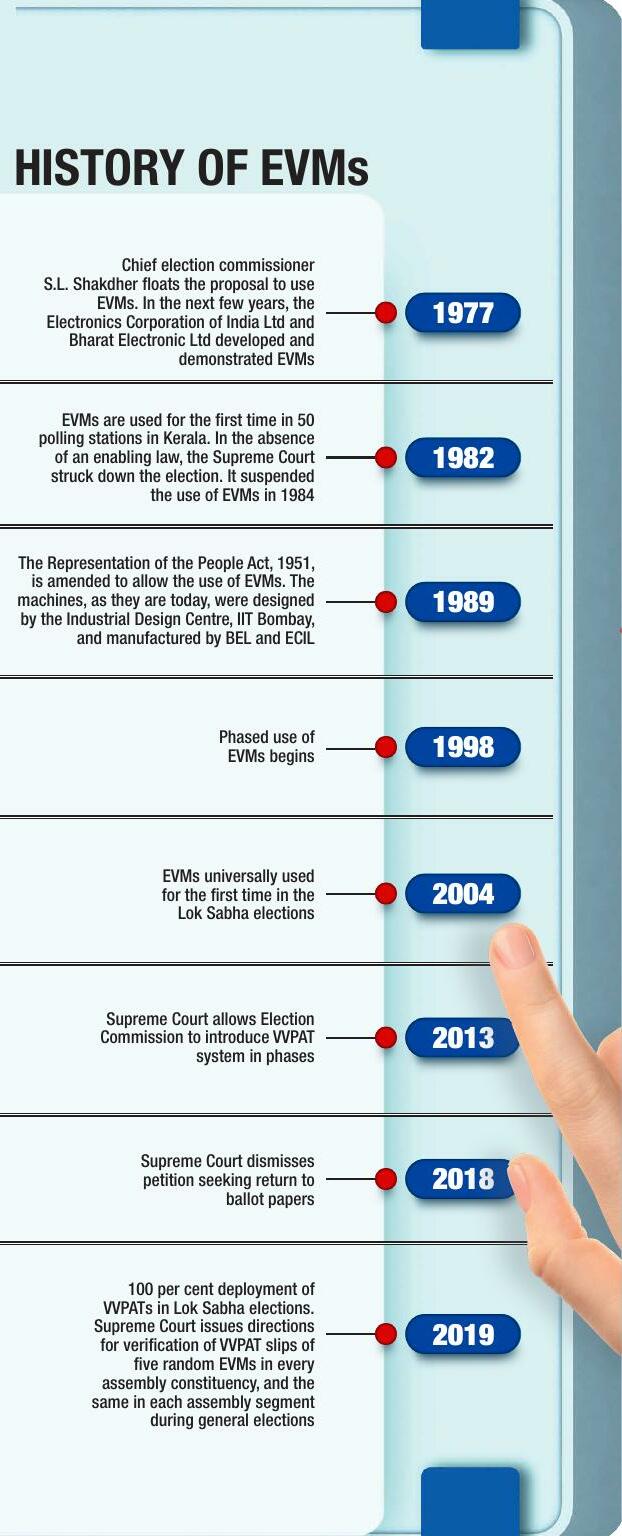Prøve GULL - Gratis
VOTE OF CONFIDENCE
THE WEEK India
|April 07, 2024
The electronic voting machine has come a long way. Even as doubts persist, the Election Commission of India and former commissioners vouch for its credibility

The Lok Sabha elections of 2004 witnessed a big technological leap. The traditional ballot box was completely replaced by the sleek Electronic Voting Machine (EVM). Polling stations across all 543 constituencies resounded with the loud beeping sound made by the EVM every time a voter cast his or her vote. In a first, the counting of the votes was completed in less than a day, which inspired a sense of amazement because the counting of ballot papers would take two to three days.
This important milestone in the country’s electoral history was recorded 20 years ago. Since then, three more Lok Sabha elections and 132 state assembly polls have been held using the EVM. The coming parliamentary elections will be the fifth since 2004 to have universal use of the EVM. It has been an eventful journey for the voting machine, hailed as a uniquely Indian innovation that has transformed the way elections are conducted in the country, even as political parties and other stakeholders have questioned its reliability at regular intervals.
The journey of the voting machine had begun much before 2004 though. In 1977, Chief Election Commissioner S.L. Shakdhar had proposed the idea of developing a voting machine. The Electronics Corporation of India Ltd, Hyderabad, and the Bharat Electronics Limited, Bengaluru, developed prototypes for the EVM.

Denne historien er fra April 07, 2024-utgaven av THE WEEK India.
Abonner på Magzter GOLD for å få tilgang til tusenvis av kuraterte premiumhistorier og over 9000 magasiner og aviser.
Allerede abonnent? Logg på
FLERE HISTORIER FRA THE WEEK India

THE WEEK India
Lore to the fore
A tribal museum in Nava Raipur celebrates Chhattisgarh's forgotten freedom fighters
3 mins
December 14, 2025

THE WEEK India
QUIET BRILLIANCE
In a world of shrinking attention span and hyperactive media consumption, a Grammy-nominated album on the Dalai Lama offers a cultural counterpoint
4 mins
December 14, 2025

THE WEEK India
THE ART OF PLAY
What video games can teach you about yourself
5 mins
December 14, 2025
THE WEEK India
Why Delhi can't be Indraprastha
The recent proposal by a Delhi BJP MP to officially rename the capital city from Delhi to 'Indraprastha'—invoking the legendary city of the Pandavas from the Mahabharat—is more than a superficial suggestion. It is a politically motivated attempt to rewrite the complex, multilayered history of one of the world’s oldest continuously inhabited metropolises.
3 mins
December 14, 2025

THE WEEK India
UKRAINIANS ARE WRITING THE CHRONICLES OF OUR TIMES WITH THEIR BLOOD, WE ARE SHAPING HISTORY
Viktor Yushchenko is a towering figure in Ukrainian politics.
10 mins
December 14, 2025

THE WEEK India
India through Mexican eyes
A book on Mexican poet Octavio Paz's years in India offers fresh perspectives
3 mins
December 14, 2025

THE WEEK India
Freedom on independence day
Volodymyr Mykolayenko, mayor of the city of Kherson in south Ukraine from February 2014 till December 2020, was aware of the perils of Russian attacks, because he witnessed the occupation of Crimea in 2014. But he never believed that Russians would attack the south of Ukraine and that too his city, Kherson. Here are excerpts from what he told Mridula Ghosh after he was freed from Russian captivity.
3 mins
December 14, 2025

THE WEEK India
'Ten'acious ties
The significance of Putin's 10th visit to India exceeds previous trips
4 mins
December 14, 2025

THE WEEK India
We shall implement the master plan as designed by the Mother
Q/When you took over, what was your idea of Auroville, and how has it changed under you?
3 mins
December 14, 2025

THE WEEK India
Moments of truth for Ukraine
Reaching the fourth year of Russian aggression, a new page opens in the history of Ukraine, torn by war and darkness, its energy infrastructure destroyed by Russia. The hour of reckoning emerges as the powers-that-be ponder how to win the war amidst a bombshell corruption investigation of the energy sector and a 28-point peace menu offered by the US
5 mins
December 14, 2025
Listen
Translate
Change font size
